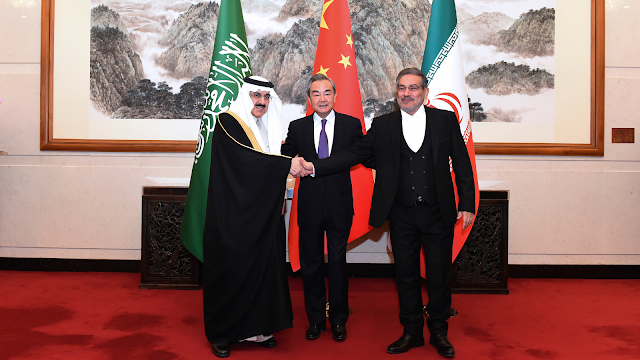China's growing global influence is evident in the Saudi-Iran deal
By taking systematic steps, Chinese President Xi Jinping is transforming his country into a global military, economic, and diplomatic power that can match or surpass the United States.
After a seven-year break, Saudi Arabia and Iran agreed to re-establish diplomatic relations and reopen their embassies after a breakthrough agreement brokered by China.
A unanimous vote in Beijing by the National People's Congress to give Xi another five years in power coincided with the agreement announced in Riyadh.
UN spokesperson Stephane Dujarric said "good neighborly relations between Iran and Saudi Arabia are essential to the stability of the Gulf region" after the rapprochement.
While the United States has been the dominant power broker in the region for decades, the White House dismissed suggestions that its influence was waning.
The National Security Council's spokesman John Kirby told reporters that "I would stridently disagree with the notion that we are stepping back in the Middle East." He said it was "a lose, lose, lose for American interests," according to Mark Dubowitz, director of the hawkish anti-Iranian Foundation for the Defense of Democracies.
A US-brokered agreement establishing formal relations between Israel, the United Arab Emirates, and Bahrain in September 2020 highlighted Washington's ability to influence competing powers in the Middle East.
President Donald Trump hailed the Abraham Accords as a significant achievement in foreign policy when they were signed at the White House.
With its involvement in the Saudi-Iran agreement, China has demonstrated diplomatic muscle in the Middle East that complements a systematic increase in Chinese involvement in Africa over the past two decades. By lending for infrastructure and mining projects throughout Africa, China grew its political influence and commercial relationships.
It alarmed the administration of President Joe Biden in December of last year that America's diminished influence in Africa, often reflected in abstentions or anti-US votes at the UN General Assembly. Whether that will dent China's role as Africa's largest trading partner remains to be seen.
A Saudi-Iran agreement could help end the long and brutal war in Yemen, where Iran backs Houthi rebels fighting Saudi-backed government opponents.
Some may see the new agreement as a chance to ease centuries-old animosity between Sunnis and Shias. Saudi Arabia portrays itself as the protector of the Sunni faith, while Iran represents the Shia minority.
As a result of a Sunni-Shia conflict, Riyadh and Tehran broke off relations in 2016. Iranian protesters invaded Saudi diplomatic posts in Iran in retaliation for the execution of a prominent Shia cleric, Nimr Baqir al-Nimr. The Saudi government beheaded him, along with 46 others, who were accused of terrorism.
Saudi Arabia blamed Iran for a series of attacks on oil installations a year later, including one that temporarily cut Saudi oil production by almost half. Iran denied the accusations.
Analysts say that the Chinese-brokered agreement is likely to dim American hopes to broker a peace deal between Israel and Saudi Arabia to forge a united front against Iran, whose apparent progress towards building a nuclear bomb is a concern for both the US and the region, as well as the International Atomic Energy Agency.
The Middle East will never be stable in our time. Will China, the world's most populous country, eventually overtake the United States? Time will tell.

.png)
Comments
Post a Comment